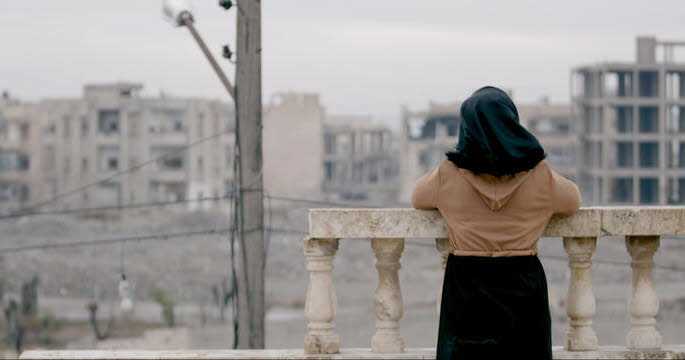Their names are Loubna, Marwa, Mouna and Khaïti. Syrians, they all lived through the revolution and were forced to flee the country. France 5 gives them the floor this evening at 9 p.m. in “Le monde en face”. Directed by Kamal Redouani, the documentary “Syria, women in war”, takes us back ten years, at the time of the Arab springs, which did not spare Syria, but did not succeed in overthrowing power.
“We civilians had nothing to do but wait for death,” Marwa tells the camera. The war was brutal and the Syrian President, Bashar el-Assad, accompanied by his allies – Russia, Iran and the Lebanese Hezbollah – without limits: bombardments of civilians, torture of opponents, chemical attacks… is added the emergence, on Syrian territory, of Daesh.
“The great forgotten of history”
Loubna, Marwa, Mouna and Khaïti hoped for a better life. Loubna witnessed the chemical attack in Ghouta, a suburb of Damascus. For having fought against Bashar al-Assad, she was considered a terrorist, wanted by Syrian intelligence. Khaïti, she dreamed of becoming a doctor but can no longer bear the sight of blood since she witnessed the death of her brother, killed in a bombardment. Marwa was 14 at the start of the war, she became a revolutionary “little by little”. With her husband, they filmed their daily life during the siege of the city of Aleppo. Finally, Mouna dared to protest, in 2014, against Daesh.
“They infiltrated the revolution, excluded us women. We no longer had the right to anything, everything was only a man’s business, all our sacrifice had been for nothing. Mouna
These women are the “great forgotten ones of history”, as Kamal Redouani calls them. “A man who comes out of prison, whether he is a revolutionary or a simple mobster, in the eyes of the Syrians, he is a hero. A woman is a whore”, says, with hidden face, a Syrian revolutionary who survived 9 months in prison for having demonstrated against the regime of Bashar el-Assad, where she was tortured and raped.
The forced exile
These women survived the revolution, but at what cost? All had to choose exile to get out of it. Their fight did not stop however. Mouna, who still cannot return to Syria, has created an association which she calls “Feminist” in Raqqa, to encourage women to participate in political debate and power. She continues to animate it from a distance, from Turkey where she lives. Loubna has fallen in love with a man seven years her junior, with whom she will settle in Nantes, France. A final snub to the Syrian tradition, which requires men to marry a younger woman.
Through their portraits, France 5 honors these fighters of this forgotten war, at a time when war is back, on the European continent this time.
